Our Library
Explore our publications, from research papers and series to educational materials, covering all aspects of conflict transformation and peace promotion.
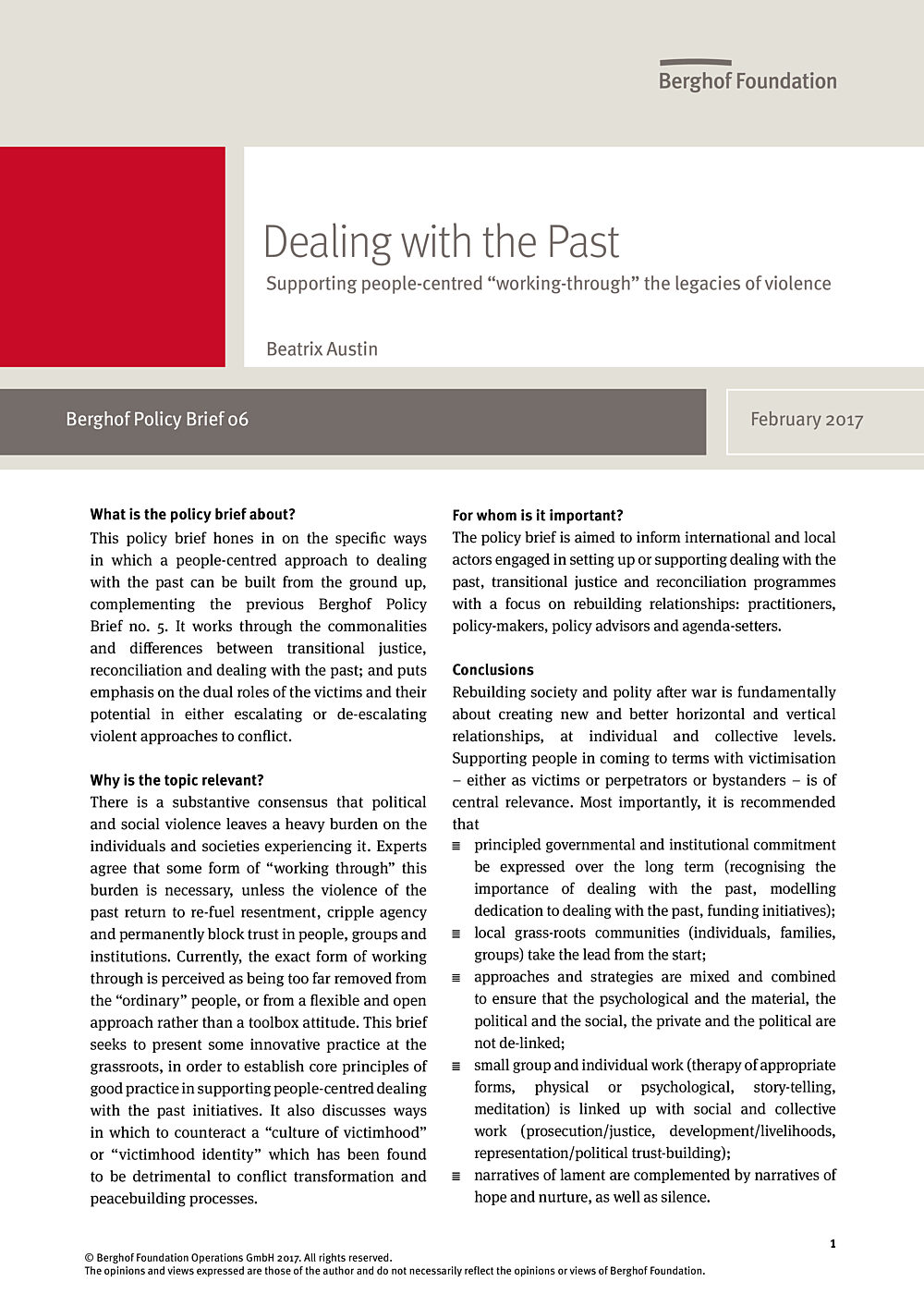
Dealing with the Past: Supporting people-centred “working-through” the legacies of violencePolicy Brief No. 6
This policy brief hones in on the specific ways in which a people-centred approach to dealing with the past can be built from the ground up, complementing the previous Berghof Policy Brief no. 5. It works through the commonalities and differences between transitional justice, reconciliation and dealing with the past; and puts emphasis on the dual roles of the victims and their potential in either escalating or de-escalating violent approaches to conflict.
- Year2017
- Author(s)Beatrix Austin
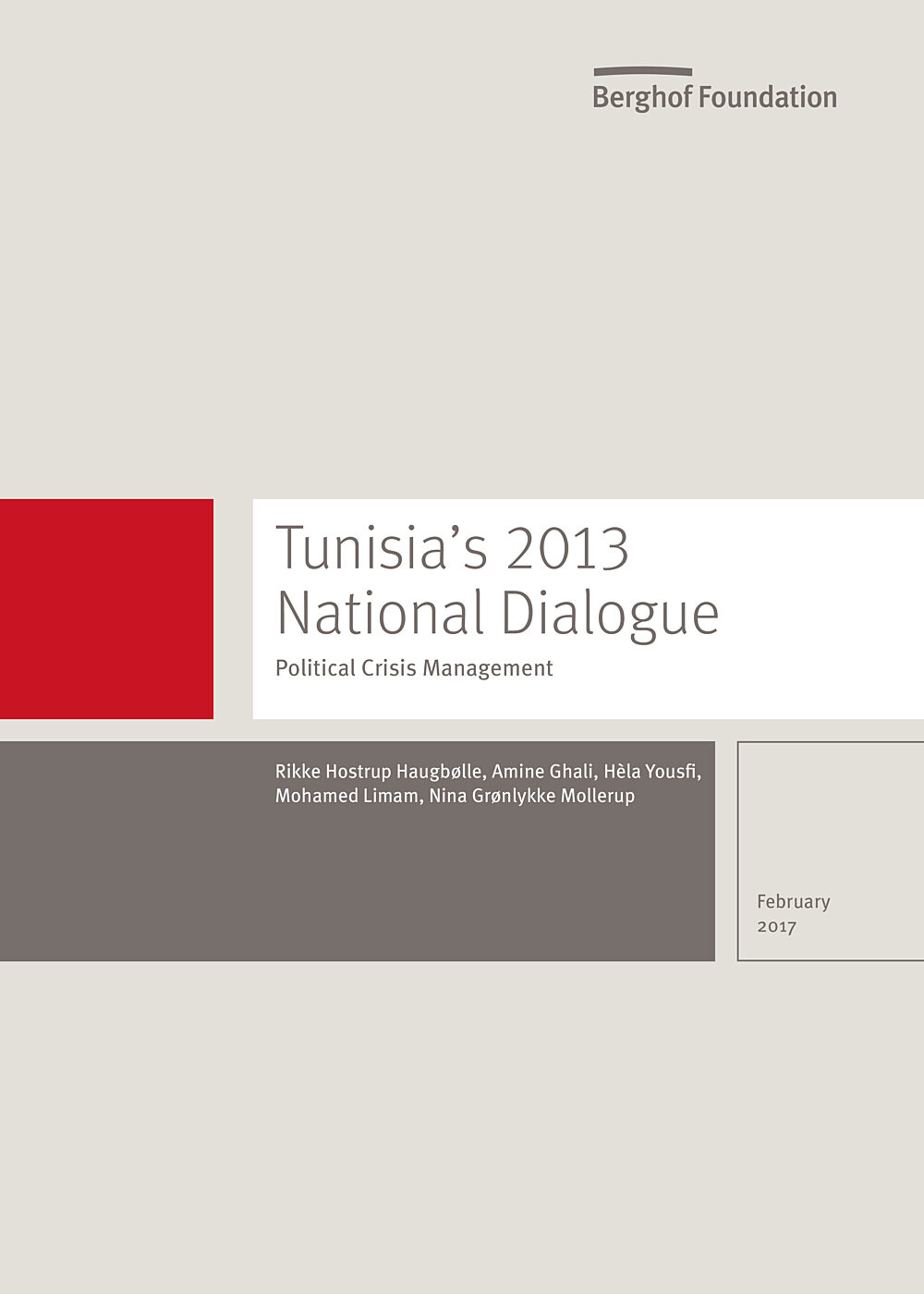
Tunisia’s 2013 National Dialogue: Political Crisis ManagementNational Dialogue Handbook: Case Studies
This publication is one of seven case studies; others include Guatemala, Lebanon, Libya, Mali, Nepal, and Sudan. The case studies provide recommendations for on-going processes in the specific country and inform the Handbook’s findings. The overall aim of the project is to improve National Dialogues and enhance the capacities and contributions of conflict parties, local stakeholders and external actors towards their successful implementation.
- Year2017
- Author(s)Rikke Hostrup Haugbølle, Amine Ghali, Hèla Yousfi, Mohamed Limam, Nina Grønlykke Mollerup
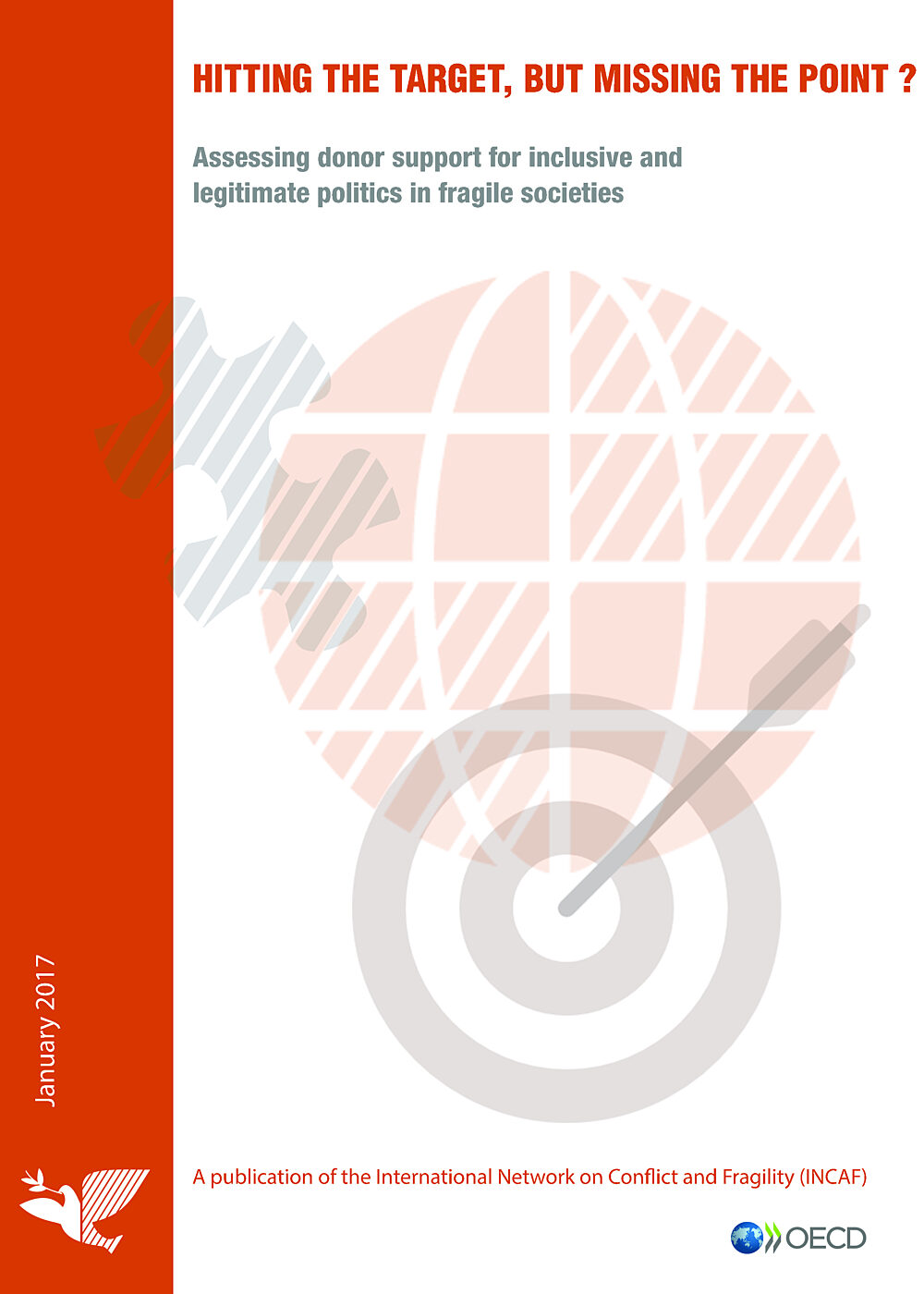
Hitting the target but missing the point?Assessing donor support for inclusive and legitimate politics in fragile societies
The International Dialogue on Peacebuilding and Statebuilding’s ‘New Deal for engagement in Fragile States’ (“New Deal”) of late 2011 promised an end to ‘business as usual’ with regard to development efforts in fragile environments. This report takes stock of the question of how bilateral and multilateral donors have conceptualized and implemented their commitment to promote ‘legitimate and inclusive political settlements and conflict resolution’ (PSG1). On the basis of empirical evidence acquired through case studies in Afghanistan, Somalia, South Sudan and Timor-Leste, the report finds that, at best, donors work with an incomplete and inadequate understanding of the typically fragmented and highly contested politics of fragile societies beyond the formal representatives of their governments and administrations.
- Year2017
- Author(s)Erwin van Veen, Véronique Dudouet
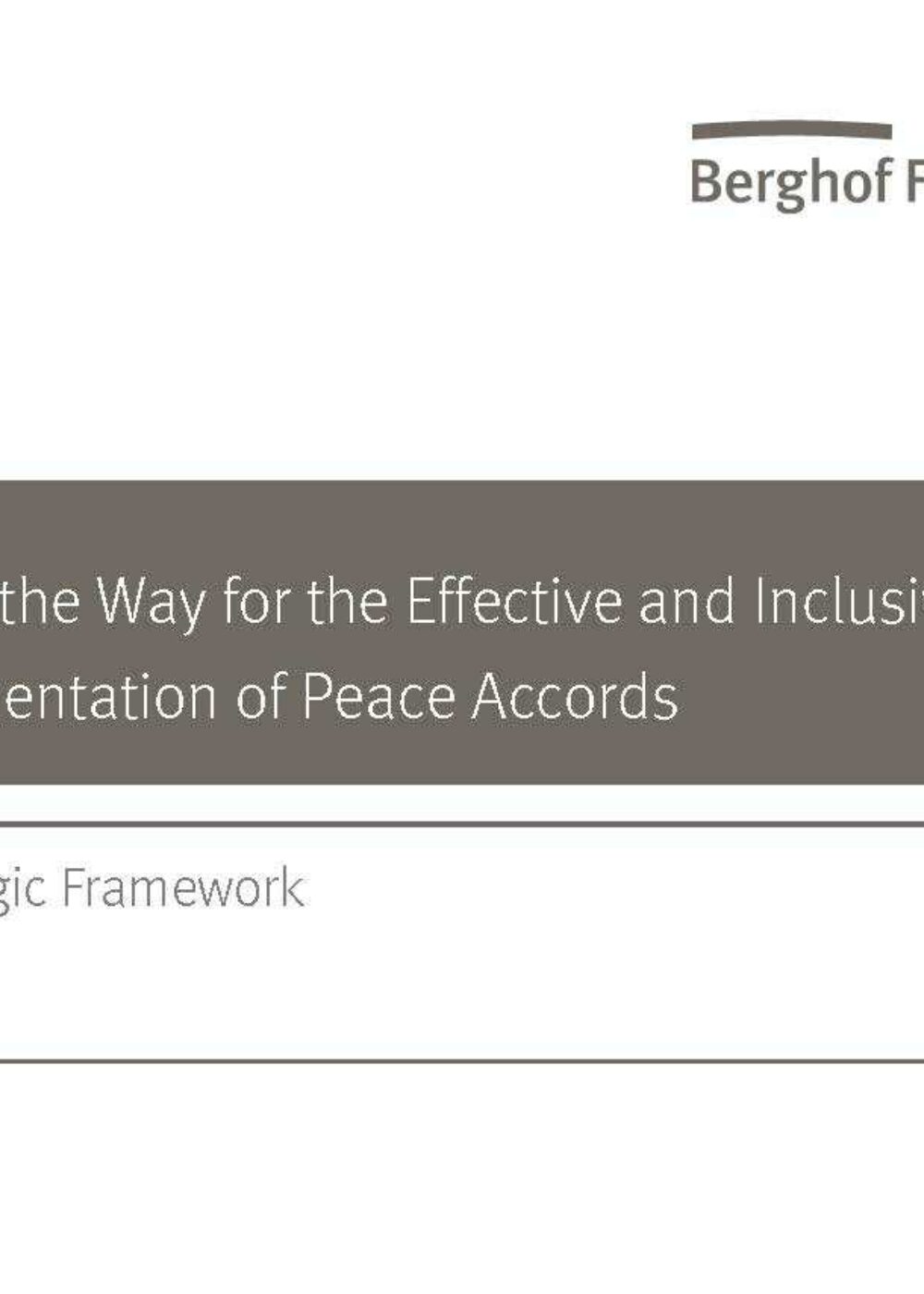
Paving the Way for the Effective and Inclusive Implementation of Peace AccordsA Strategic Framework
This strategic framework was developed during the 8th Meeting on Negotiations entitled The Implementation of Accords and the Role of International Third Parties held in October 2016, in Berlin. It provides an overview of some of the most frequent challenges Resistance and Liberation Movements (RLMs) are facing with regard to the implementation phase of peace agreements and ways to overcome them. This overview aims at giving our readers the possibility to reflect and improve their strategies in the nexus of negotiation and implementation.
- Year2017
- Author(s)Nico Schernbeck, Luxshi Vimalarajah
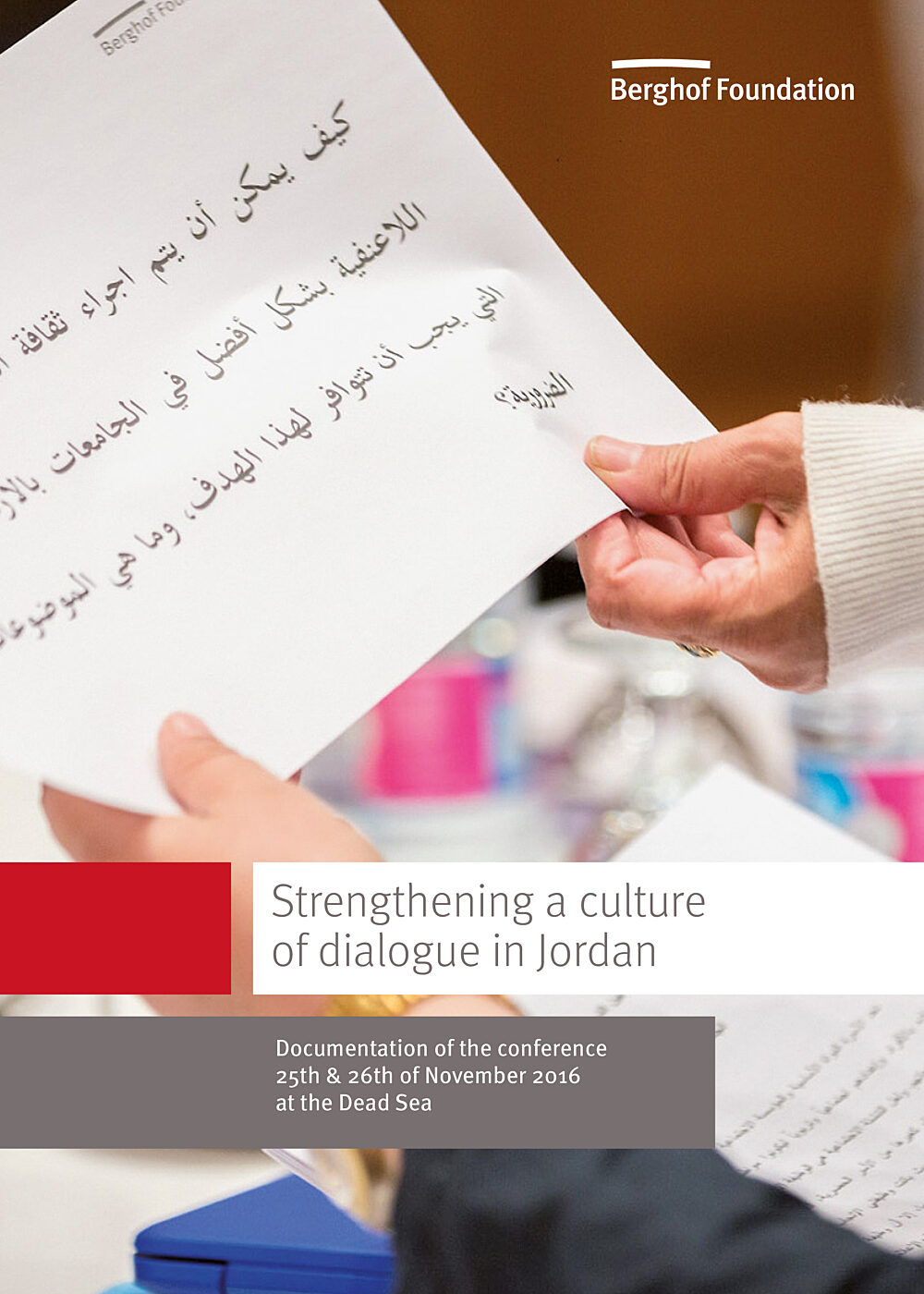
Documentation Conference "Strengthening a culture of dialogue in Jordan"
The documentation of the conference gives an insight into the different panel speeches, the vivid discussions as well as the thorough exchange of experiences and expertise between multipliers, including several university presidents and professors, as well as Jordanian and German experts with political, social or educational backgrounds. This exchange was particularly enabled through the interactive method "World Café".
- Year2016
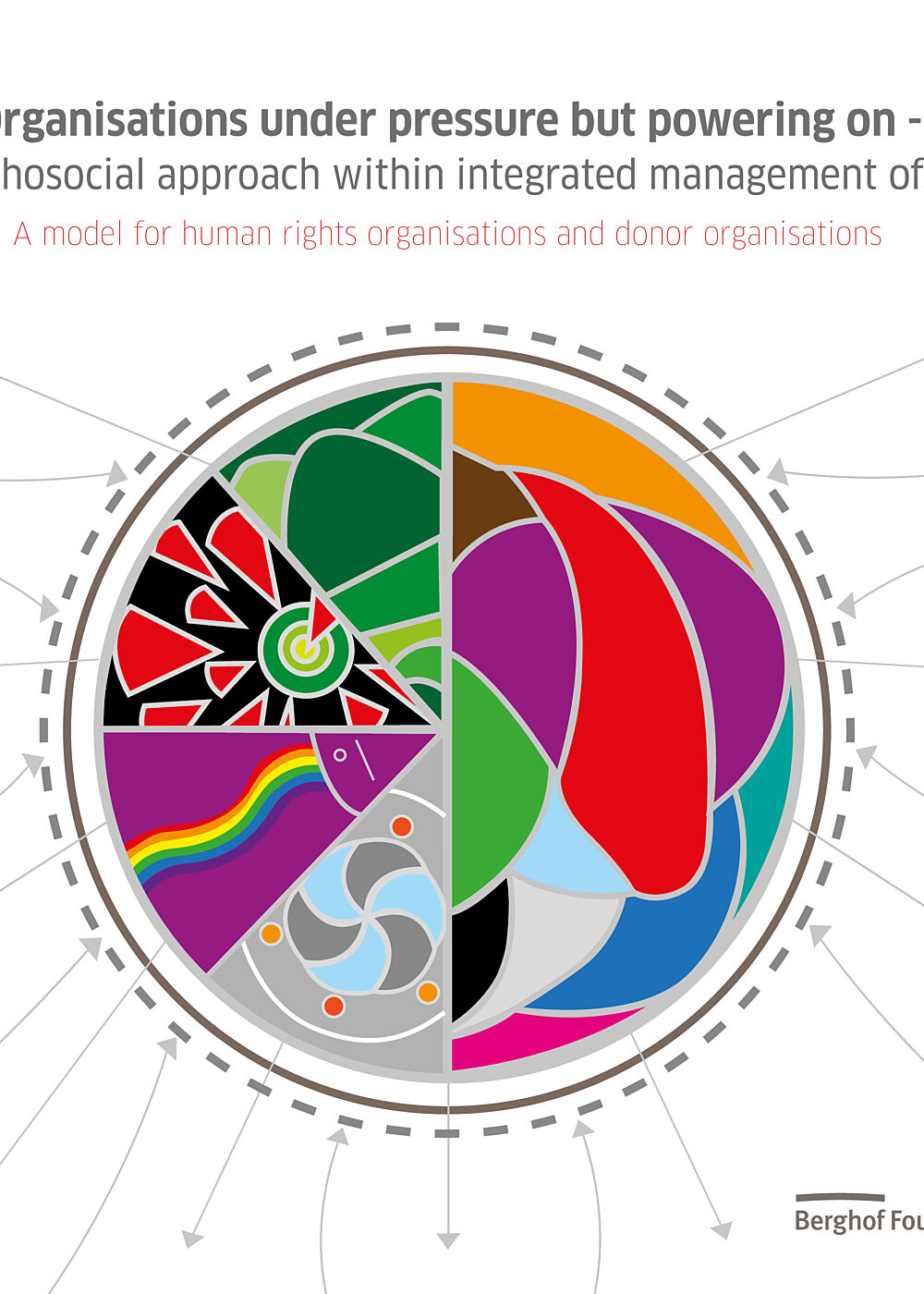
Organisations under pressure but powering on: The psychosocial approach within integrated management of threatA model for human rights organisations and donor organisations
This guide offers a model and elaborates its recommendations for threatened human rights organisations and donor organisations on dealing with threat in an integrated manner. It specifically focuses on incorporating a psychosocial approach into the organisations’ routines, spaces and structures as a crucial element of integrated threat management. Drawing together lessons and insights from a joint learning process within the framework of the project “MAPA”, it emphasises how HRO and donors can work together towards achieving this goal. The guide is meant to help initiate a change process and stimulate further engagement with the topic, thereby seeking to contribute to maintaining human rights organisations’ scope for action in violent contexts. Understood as complementary to existing literature, this interactive guide provides links to other publications on the topic.
- Year2016
- Author(s)Antonia Montanus, Nele Rathke, Barbara Unger
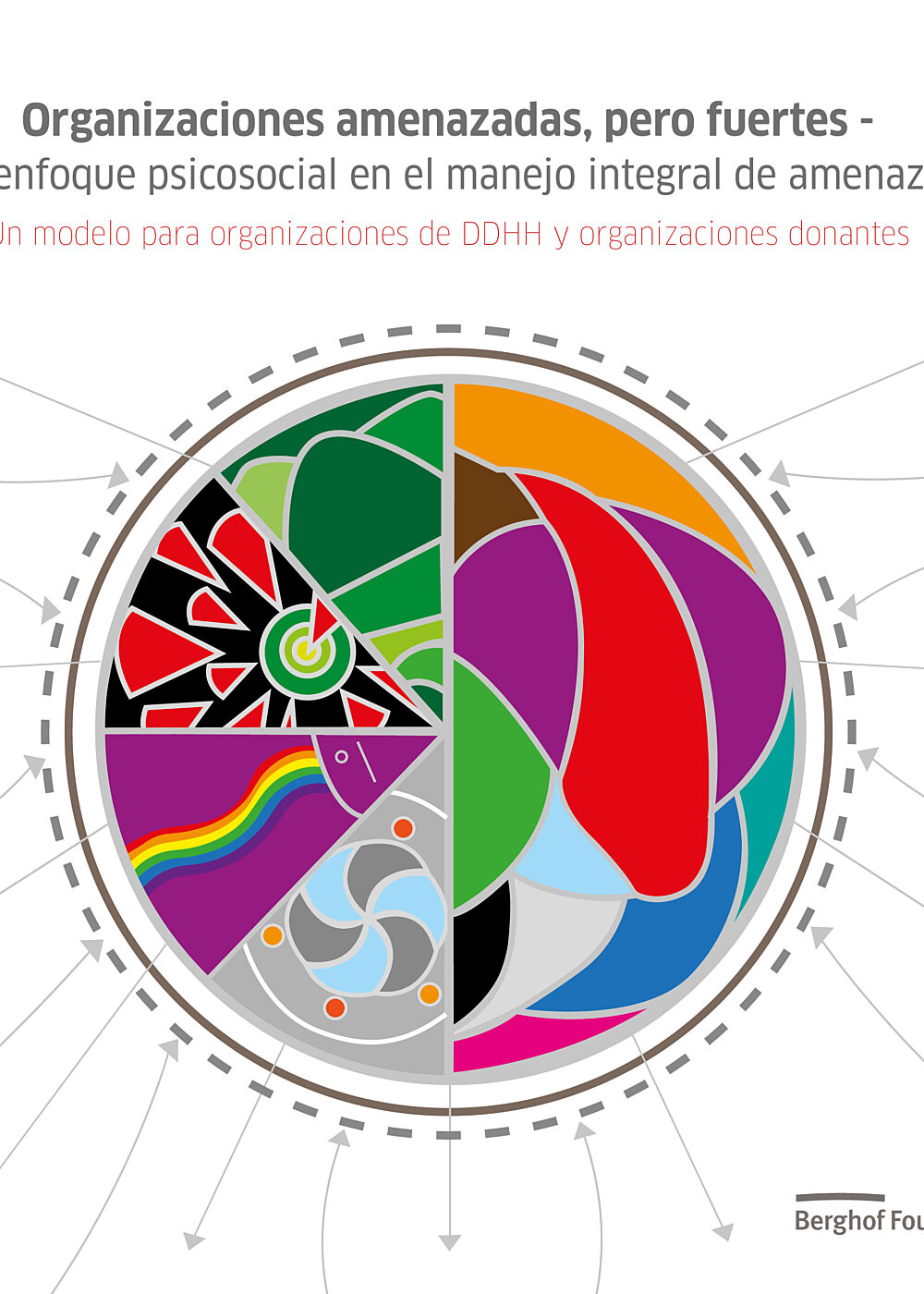
Organizaciones amenazadas, pero fuertes - Un enfoque psicosocial en el manejo integral de amenazasUn modelo para organizaciones de DDHH y organizaciones donantes
Este guía brinda un modelo y detalla recomendaciones para organizaciones de DDHH amenazadas y organizaciones donantes sobre cómo integrar un enfoque psicosocial en las rutinas, espacios y estructuras de sus organizaciones como elemento clave para un manejo intregal de amenazas. Basado en lecciones de un proceso de aprendizaje conjunto dentro del marco del proyecto MAPA hace hincapié en cómo organizaciones DDHH y donantes pueden conjuntamente trabajar hacía esa meta. El guía apoya a iniciar un proceso de cambio y estimula tratar el tema, contribuyendo así a mantener el espacio de actuación para organizaciones de DDHH en contextos de violencia. Entendido como complementario a recursos existentes, la versión interactiva brinda enlaces a otras publicaciones pertinentes.
- Year2016
- Author(s)Antonia Montanus, Nele Rathke, Barbara Unger
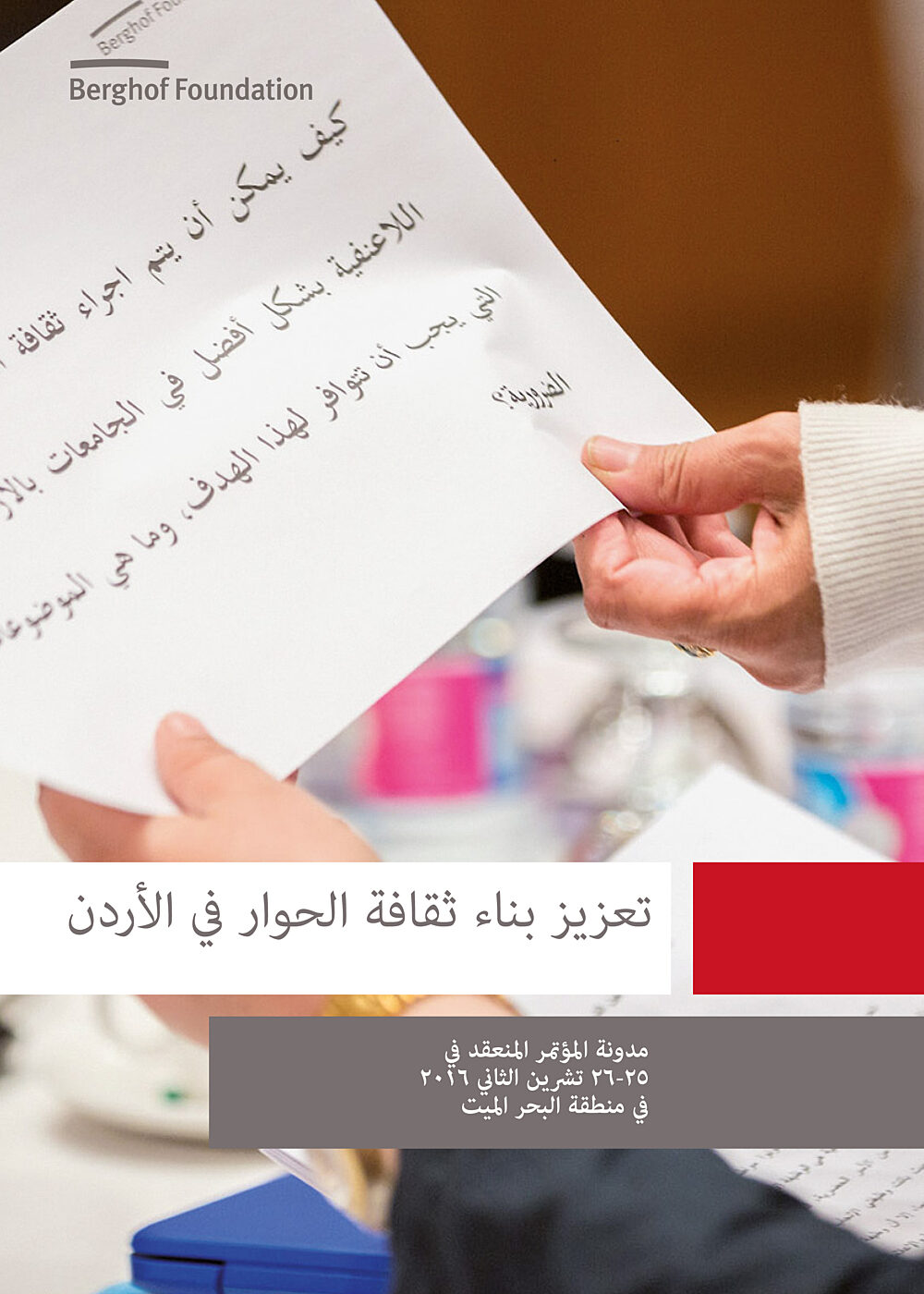
تعزيز بناء ثقافة الحوار يف األردنمدونة املؤمتر املنعقد
[ترجمة آلية الملخص]
يعطي توثيق المؤتمر نظرة ثاقبة لخطب اللجان المختلفة والمناقشات الحية بالإضافة إلى التبادل الشامل للتجارب والخبرات بين المضاعفين ، بما في ذلك العديد من رؤساء الجامعات والأساتذة ، فضلاً عن الخبراء الأردنيين والألمان من ذوي الخلفيات السياسية أو الاجتماعية أو التعليمية. تم تمكين هذا التبادل بشكل خاص من خلال الطريقة التفاعلية "مقهى العالم".
- Year2016
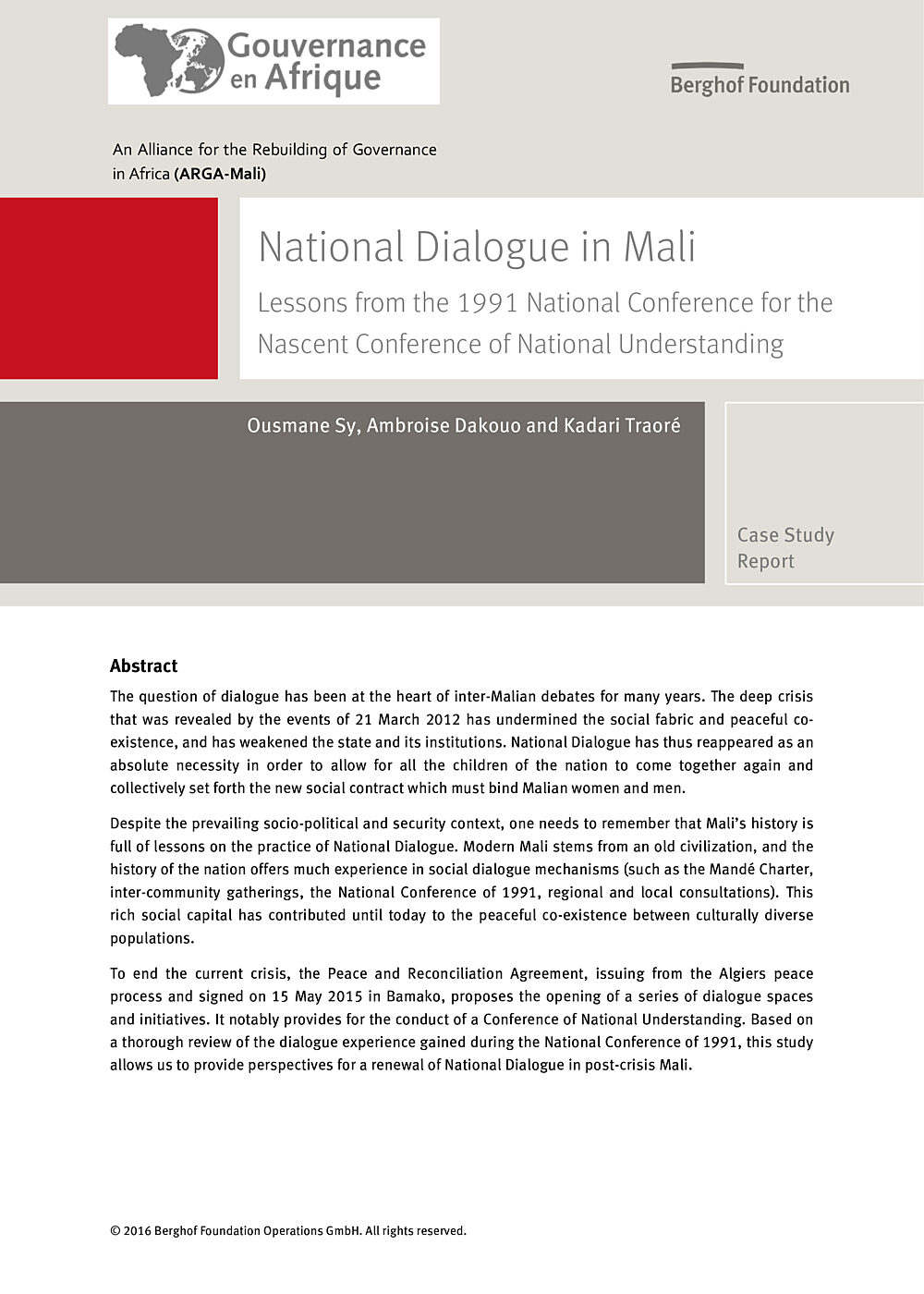
National Dialogue in Mali: Lessons from the 1991 National Conference for the Nascent Conference of National UnderstandingNational Dialogue Handbook: Case Studies
The question of dialogue has been at the heart of inter-Malian debates for many years. The deep crisis that was revealed by the events of 21 March 2012 has undermined the social fabric and peaceful co-existence, and has weakened the state and its institutions. National Dialogue has thus reappeared as an absolute necessity in order to allow for all the children of the nation to come together again and collectively set forth the new social contract which must bind Malian women and men. Based on a thorough review of the dialogue experience gained during the National Conference of 1991, this study allows us to provide perspectives for a renewal of National Dialogue in post-crisis Mali.
- Year2016
- Author(s)Ousmane Sy, Ambroise Dakouo, Kadari Traoré
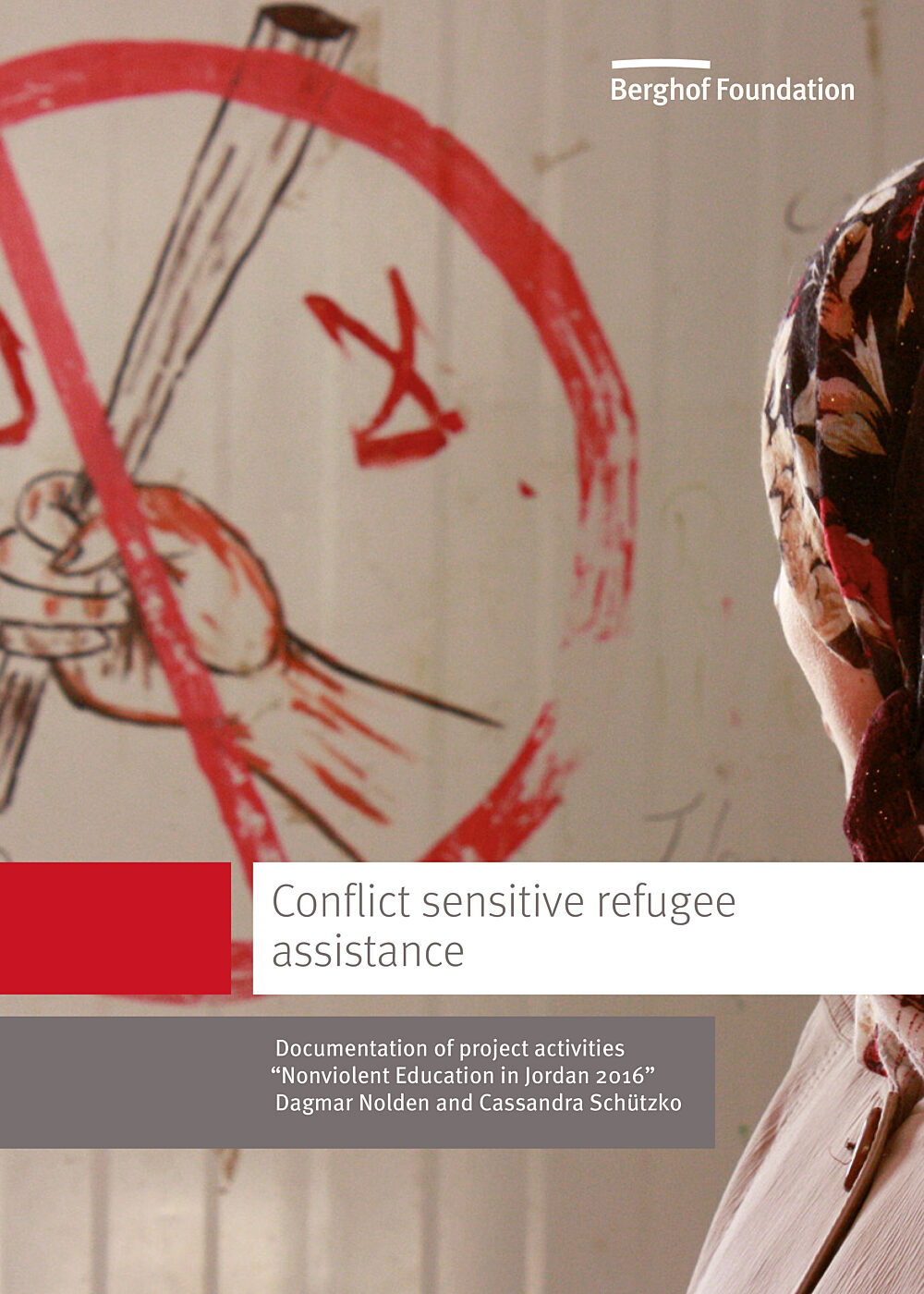
Conflict sensitive refugee assistanceDocumentation of project activities “Nonviolent Education in Jordan 2016”
Today, conflict sensitivity is a renown and established concept in the fields of education, development cooperation, and journalism. The concept is based on the assumption that every human action, well-intended or not, is a form of intervention in a certain context and, thus, interacts with it. In consequence, no action can be understood as neutral as they contain both, the potential to cause or intensify conflicts, but also the potential to promote and strengthen peace. Up to now, the concept has been mainly applied in professional contexts in former and current regions of crisis and conflict. The Berghof Foundation, however, perceives it as extremely valuable to apply it specifically to the field of professional and voluntary refugee assistance, where well-intended actions are often followed by misperceptions and frustrations that may culminate in the use of violence, instead of the envisioned outcome. The Berghof Foundation’s good experiences with a workshop format on conflict sensitive refugee assistance for volunteers engaged in the field in Germany and the affirmative feedback received by workshop participants, fed into the development of the two different formats of the model workshops on conflict sensitive refugee assistance in Jordan.
- Year2016
- Author(s)Dagmar Nolden, Cassandra Schützko